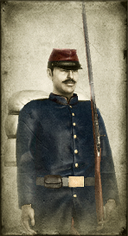
Basic Unit Statistics (can be modified by difficulty level, arts, skills, traits and retainers)
| Recruitment Cost | 1430 | |
| Upkeep Cost | 180 | |
| Melee Attack | 11 | 31% |
| Charge Bonus | 20 | 40% |
| Bonus vs Cavalry | 7 | 23% |
| Range | 125 | 19% |
| Accuracy | 75 | 75% |
| Reloading Skill | 70 | 70% |
| Ammunition | 15 | 18% |
| Melee Defence | 6 | 17% |
| Armour | 2 | 13% |
| Morale | 12 | 24% |
Strengths & Weaknesses
- Very good accuracy and reload rate.
- Good in melee.
- Very good morale.
Abilities
- Kneel Fire - The first rank of this unit will kneel to allow the first two ranks to fire simultaneously.
- Suppression Fire - This ability increases reload rate but lowers accuracy. Enemy units hit by suppression fire are slowed and suffer a morale penalty.
Requires
Description
These hardy marines have learned their business in tough, colonial wars across the world.
These French line infantry are tough, capable soldiers, well used to fighting in all corners of the world and dealing with whatever hardships and enemies of France they encounter. They are armed with modern breech-loading rifles and are well trained in their use. This allows them to pour accurate and rapid fire into enemies stupid enough to act as targets. They are also well able to charge into melee and give a good account of themselves. As Frenchmen they naturally have élan, and this gives them very good melee in most circumstances. Like all infantry, however, bravery and dash are no use when bombarded by artillery. The infanterie de marine could trace their origins back to 1622, when the troupes de marine were established by Cardinal Richelieu, Louis XIII's chief minister. Apart from being a brilliant administrator and statesman, he was also used later as the chief villain in Dumas' tale, "The Three Musketeers"; sadly for Richelieu's other achievements, that's how most people know of him. The troupes de marine were intended to fight overseas, and in the new French colonies. This meant they saw a good deal more action than most of the French army, usually against troublesome British fellows. Oddly, infanterie de marine weren't directly controlled by the French Navy, but by the Ministere de la Marine, the civil servants who ran the navy and also the French colonies. It suited the Ministry to divert marines to keep the colonies in order, rather than to help the Navy! As a result, the Navy had to recruit its own "fusiliers-marins" to replace what should have been its marines. The Ministere de la Marine, glad to keep the infanterie de marine, let them get on with it.